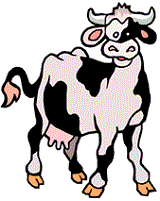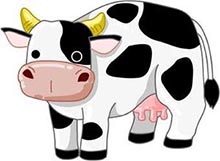Investigation: DNA, Proteins, and Mutations
 Below
are two partial sequences of DNA bases (shown for only one strand of DNA) Sequence
1 is from a human and sequence 2 is from a cow. In both humans and cows, this
sequence is part of a set of instructions for controlling a bodily function.
In this case, the sequence contains the gene to make the protein insulin. Insulin
is necessary for the uptake of sugar from the blood. Without insulin, a person
cannot use digest sugars the same way others can, and they have a disease called
diabetes.
Below
are two partial sequences of DNA bases (shown for only one strand of DNA) Sequence
1 is from a human and sequence 2 is from a cow. In both humans and cows, this
sequence is part of a set of instructions for controlling a bodily function.
In this case, the sequence contains the gene to make the protein insulin. Insulin
is necessary for the uptake of sugar from the blood. Without insulin, a person
cannot use digest sugars the same way others can, and they have a disease called
diabetes.
Instructions:
1 Using the DNA sequence, make a complimentary RNA strand from both the human and the cow. Write the RNA directly below the DNA strand (remember to substitute U's for T's in RNA)
2. Use the codon table in your book to determine what amino acids are assembled to make the insulin protein in both the cow and the human.
*Note: This is not the real sequence for insulin, which actually contains 51 amino acids. Uniprot provides full sequencing information on insulin and known variants. http://www.uniprot.org/uniprot/P01308
HUMAN DNA |
|||||||||
DNA |
CCA |
TAG |
CAC |
GTT |
ACA |
ACG |
TGA |
AGG |
AAA |
RNA |
|
|
|
|
|
|
|
|
|
Amino Acid |
|
|
|
|
|
|
|
|
|
COW DNA |
|||||||||
DNA |
CCA |
TAG |
CAT |
GTT |
ACA |
ACG |
CGA |
AGG |
GAC |
RNA |
|
|
|
|
|
|
|
|
|
Amino Acid |
|
|
|
|
|
|
|
|
|
Analysis

1. Compare the DNA Sequence and circle any single base that is different in the cow and human sequences. How many bases are different? _______
2. Examine the amino acids produced. Highlight in yellow any amino acids that are different in the two sequences. How many are there? _____
3. Could two humans (or two cows) have some differences in their DNA sequences for insulin, yet still make the exact same insulin proteins? Explain.
4. Examine the codon chart and list all of the codons that code for the amino acid leucine. List them:
MUTATIONS: Changes in DNA
Diabetes is a disease characterized by the inability to break down sugars. Often a person with diabetes has a defective DNA sequence that codes for the making of the insulin protein. This mutation is called a POINT MUTATION because only one base is affected.
When the amino acid in a sequence has been changed, the shape of the protein changes and can become less functional (or not function at all.)
5.. Suppose a person has a mutation in their DNA, and the first triplet for the gene coding for insulin is T A T (instead of C C A). Determine what amino acid the new DNA triplet codes for. Will this person be diabetic? Explain
6. A SILENT MUTATION occurs when the nucleotide changes, but the resulting amino acid is the same. The protein that is made from this new DNA will have no functional difference from the original.
What if a mutation occurred in the human insulin gene and the first triplet was changed to C C G? Is this a silent mutation? Explain how you know.
A FRAMESHIFT MUTATION occurs when a base is added (or removed) from a DNA/RNA sequence.
7. Determine the amino acid chain coded for by the following sequence. Suppose a mutation occurs where another A is added after the first codon. What would the new sequence of amino acids be?
Normal DNA: T G G A G T C G A G G T
Normal RNA:
Amino Acids:
Mutant DNA: T G G A A G T C G A G G T
Mutant RNA:
Amino Acids.
Why are frameshift mutations likely to cause more problems than a point mutation?
8. A NONSENSE MUTATION occurs when a codon is changed to a STOP codon. Many proteins are thousands of amino acids in length. At the end of the gene, the cell reaches the stop codon. If a codon is changed to STOP, the building of the amino acid terminates and the protein is incomplete.
Why would a Nonsense mutation be less damaging if it occurred at the end of the gene rather than the beginning?
Gene Sequences Across Species
9. DNA sequences are often used to determine relationships between organisms. DNA sequences that code for a particular gene can vary widely. Organisms that are closely related will have sequences that are similar.
Below is a list of sequences for a few organisms:
| Human: |
Chimpanzee: |
| Pig: |
Cricket: |
Based on these sequences, which two organisms are most closely related? ________________________
10. An unknown organism is found in the forest and the gene is sequenced as follows:
Unknown: C C A T G G A A T C G A .........
What kind of an animal do you think this is? _______________________________
SYNTHESIS
Answer each of the following using a single summary sentence.
11. What is the relationship between DNA, codons, and proteins?
12. How does the shape of a protein relate to its function?
13. Explain why some mutations are more harmful than others.
14. Construct an explanation based on evidence for how the structure of DNA determines the structure of proteins which carry out the essential functions of life through systems of specialized cells.

Other Resources on DNA
Coloring DNA - basic image of DNA and RNA for students to color following directions; includes questions and analysis
Transcription & Translation Coloring - shows structures involved, nucleotides, base pair rules, amino acids
DNA, Proteins, and Sickle Cell - explore how a single change (mutation) in DNA can result in a blood disorder
Coloring DNA - basic image of DNA and RNA for students to color following directions; includes questions and analysis

